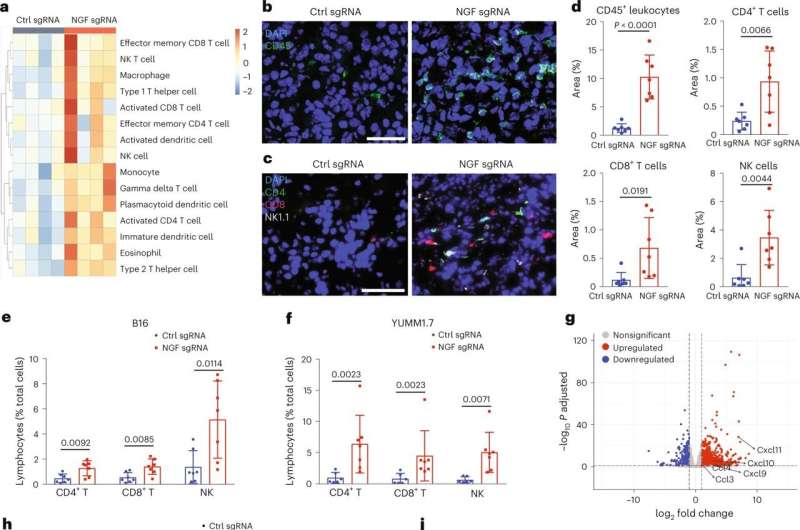This article has been reviewed according to Science X's editorial process and policies. Editors have highlighted the following attributes while ensuring the content's credibility:
fact-checked
peer-reviewed publication
trusted source
proofread
Scientists discover how deadly skin cancer evades the human immune system

An international study led by Dr. Li Qi-Jing from the Agency for Science, Technology and Research (A*STAR) has revealed a mechanism by which melanoma, the most aggressive form of skin cancer, evades the immune system.
Melanoma is notoriously difficult to treat in its advanced stages. Despite some treatments that have improved outcomes, a category of melanomas remains "cold," meaning they are unresponsive to current therapies.
The findings, recently published in the Nature Immunology, demonstrate that human melanomas utilize nerve growth factor (NGF), a protein crucial for nerve development, to shield themselves from the body's immune responses. This sheds light on how these resistant melanomas camouflage themselves from immune detection.
Deciphering melanoma's evasion tactics
The research team, employing advanced genetic engineering techniques, found that NGF and its receptor TrkA create a "cold" tumor environment by altering the behavior of both tumor cells and immune cells. In melanoma cells, NGF and TrkA diminish the production of signals that typically attract immune cells to the tumor site. Furthermore, they also inhibit the activation of immune cells tasked with destroying cancer cells.
This critical discovery not only enhances the understanding of tumor immune evasion but also opens the door to new therapeutic strategies. "The prevalence of NGF-TrkA signaling in human melanomas provides a predictive marker of treatment response and overall patient outcome," explained Dr. Li, Distinguished Principal Scientist at A*STAR's Institute of Molecular and Cell Biology (IMCB) and Singapore Immunology Network (SIgN).
The study was conducted in collaboration with a global network of researchers and institutions, including Duke University School of Medicine, Shanghai Institute of Nutrition and Health, H. Lee Moffitt Cancer Center and Research Institute, Zhejiang University School of Brain Science and Brain Medicine, as well as biotechnology companies TCRCure Biopharma and Hervor Therapeutics.
Unlocking new avenues for melanoma treatment
The potential for improving cancer treatments through this research is significant. The study highlights the efficacy of TrkA inhibitors, such as the FDA-approved larotrectinib, which block the activity of the TrkA receptor. These inhibitors counter the immune-evasive actions of NGF and TrkA, thereby enhancing the effectiveness of immunotherapies.
Currently, TrkA inhibitors like larotrectinib are only approved for a small percentage of melanoma patients with specific TrkA mutations. However, the new findings suggest that these inhibitors could have a much broader application. By repurposing TrkA inhibitors as immune sensitizers, which make cancer cells more vulnerable to the body's immune response, they could potentially benefit a wider range of melanoma patients, including those without TrkA mutations.
"We are excited about the possibilities this opens up for a broader range of patients resistant to immunotherapy," said Dr. Li.
"Preliminary analysis of melanoma samples from 104 patients at Moffitt Cancer Center showed 75% of patients express high levels of NGF, suggesting this strategy could benefit the majority of those suffering from this aggressive cancer."
More information: Tao Yin et al, Breaking NGF–TrkA immunosuppression in melanoma sensitizes immunotherapy for durable memory T cell protection, Nature Immunology (2024). DOI: 10.1038/s41590-023-01723-7





















